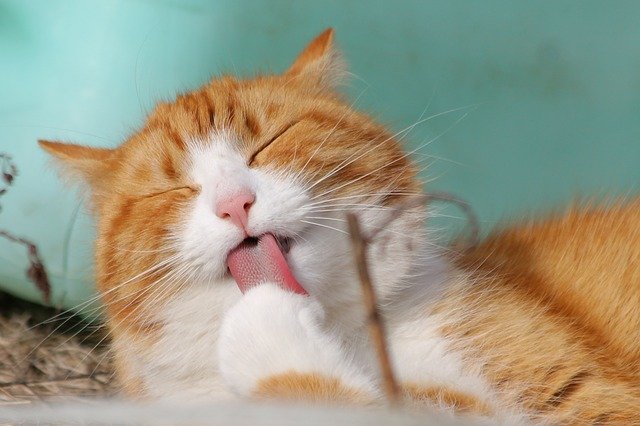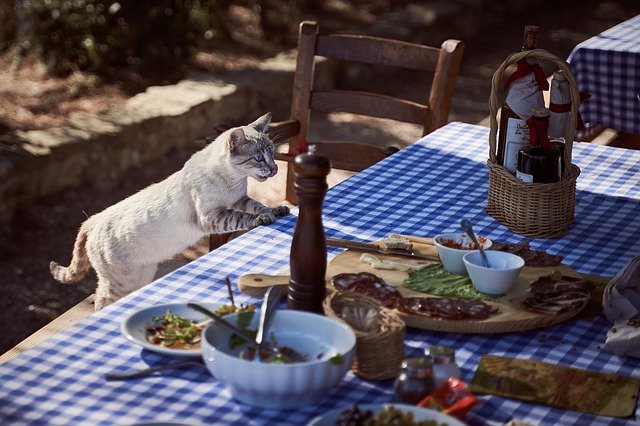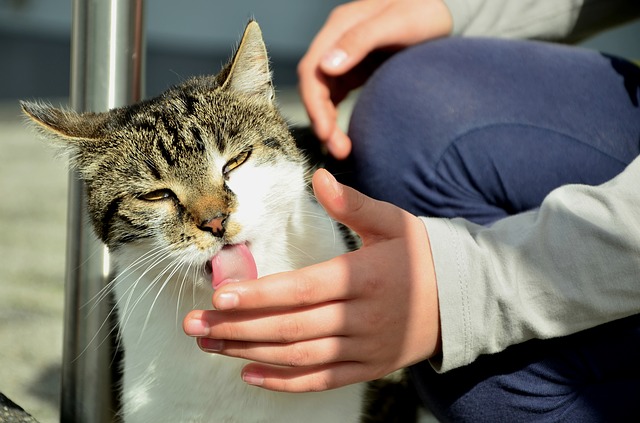For many cat lovers, the pleasure of interacting with their kitties can be enjoyed in so many different ways.
From cuddling to playing fetch with them, the possibilities for fun are almost endless.
But is kissing or sharing saliva with your cat going a step too far? Or is it just one more perk you get from having your feline pal?
Let’s investigate…
The Risks
Like human beings, all animals (including your kitty) carry germs.
While common pet-borne illnesses like canine parvovirus, distemper, and heartworms can’t spread to humans, there is a wide range of zoonotic diseases that we can contract when we come in contact with our pet’s saliva, dander, or waste.
In particular, you can contract the following from your kitty’s drool:
A. Bacteria
Cats that spend more time outdoors harbor a wide range of bacteria in their saliva. These include
Bartonella henselae, Pastuerella, Campylobacter, Salmonellla, E. coli, and Clostridia—all of which can cause severe infections in humans.
Campylobacter jejuni is known to cause fever, diarrhea, and abdominal pain in humans.
Bartonella henselaeis associated with cat scratch disease, a bacterial infection carried in a cat’s saliva. Symptoms include fever, swollen lymph nodes, tiredness, and headaches.
B. Parasites
Your kitty also carries parasites like toxoplasmosis in her saliva. Infection from these parasites can cause skin issues, blindness, intestinal diseases, and brain disorders.
Your feline friend may live with these parasites in her intestines with no signs of illnesses but eggs passed in her feces may infect you, especially if she licks her anus and later licks your face or kiss you.
The good news is that most cats aren’t coprophagic (feces eaters), so you are less likely to get infected with these parasites.
C. Ringworms
Ringworm is also a common fungal infection that you can easily contract from your cat. While it is relatively harmless, it is more prevalent in children and can be quite frustrating to get rid of.
D. Rabies
We bet you’ve heard of rabies before.
You can also contract this fatal disease from your kitty’s drool if she is infected.
It can take up to 7 months for an infected cat to show signs of this zoonotic virus but once symptomatic, the cat often succumbs within 7-12 days.
Human rabies is rare and there is a vaccine for treatment following a bite or infection from a potentially rabid animal.
E. Allergic Reactions
Some people also get allergic reactions to cat saliva which makes them sneeze, have watery eyes, itches, skin rash, experience nasal congestion or shortness of breath.
Out of the 8 known allergens that have been identified in cats, the most common are Fel d1 and Fel d4, proteins that are also found in cat’s saliva.
The Most Vulnerable Groups
The likelihood of contracting the above highlighted zoonotic illnesses from your kitty’s drool is low but people with weakened or immature immune systems are more susceptible to the diseases.
This includes the elderly, children, people with HIV, diabetics, individuals undergoing cancer chemotherapy, or people receiving drugs that may suppress their immune systems.
Most zoonotic diseases rarely lead to death and can be treated with antibiotics. However, tragic consequences can still occur and a few cases have been reported in the past.
For example, a woman was killed in Melbourne when a cat licked her wound causing her to contract bacterial meningitis. This drove her into a coma for 9 days with the need to be on life support.
A woman in Australia also ended up having her left leg, right foot, fingers, and toes amputated after her pet licked her wound.
Important Precautions to take when dealing with cat drool

Although there is a low risk of infection from cat drool, especially if your immune system is not compromised, it is prudent to take certain precautions when dealing with your kitty’s licks:
- Routinely vaccinate your kitty on a schedule recommended by your local vet to keep her healthy and to reduce the risks of potential infections spreading to your kids.
- Regularly take your cat to your local vet for fecal examination as well as flea and anti-parasite treatments
- Regularly feed your cat nutritious and balanced food as well as plenty of clean, fresh water.
- Limit your children’s contact with your kitty if she spends more time outside hunting and killing prey because she can eat infected meat and pass the infection to your kids.
- Wash your hands after playing or handling your kitty
- Regularly brush your cat’s teeth or administer appropriate cat mouth wash to ensure her oral health.
Related post: 10 Best Cat Dental Water Additives
- Regularly take your cat for deworming programs
- Clean any form of scratches or bites with warm water and appropriate ant-bacterial soap even if the scratch/bite doesn’t break the skin.
- If possible, make your cat an indoor cat. She has higher chances of contracting a wide range of zoonotic diseases if you allow her to roam outside.
FAQs
Is Cat Saliva Clean For Humans?
A cat’s saliva may be a vital part of her own hygienic maintenance such as grooming or cleaning her coat.
However, from the human perspective, a cat’s mouth and saliva would have to be filthy or unhygienic.
Cats usually probe, touch, or lick surfaces and objects that humans would not consider healthy to touch with their mouths. This includes licking poop remains from their butts, licking spills from the floor, or touching carcasses of dead animals.
All these can leave their tongues covered with a wide range of bacteria, fungi, or viruses.
The bacteria in the cat’s saliva usually don’t cause any illness to cats. However, once it enters the human body, it can cause a wide range of diseases.
Some harmful bacteria in a cat’s saliva can also come indirectly to you from her paws. For example, cats typically clean themselves fastidiously using their paws and tongue.
The tongue can transfer bacteria into her paws. When the cat scratches you, it will infect you with diseases like cat scratch disease.
What Happens If You Get Cat Saliva In Your Mouth?
Given how much licking a cat does, it’s not unusual for cat saliva to find its way into your mouth.
In most cases, this will not cause any significant illness. However, there is a chance that infection may occur due to the bacterial content of the saliva.
Despite the presence of bacteria in human saliva, human beings can safely exchange saliva among themselves, for instance, through kissing. That’s because they have the same types of bacteria which is familiar to their immune system.
Our immune system has evolved along with these bacteria. However, cat saliva has many bacteria that are foreign to human saliva.
Our immune system has not learned how to handle these foreign bacteria which makes us susceptible to infections and diseases.
As aforementioned, the effects can be especially bad to people with weaker immune systems, babies, or the elderly.
Should I Let My Cat Lick Me?

A cat licking you is her way of expressing affection, or seeking your attention.
Cats themselves also lick each other to create a group’s scent and make themselves familiar as part of the group.
It’s possible that cats also do this to humans to include them as part of their group or family.
To bond with your cat, you may have to accept the affection she’s showing you and tolerate some licking.
However, to be safe, the licking should be away from your nose, eyes, or mouth, where the bacteria could end up infecting you.
These areas provide an easy entry point for bacteria considering that they are made of permeable mucous membranes.
However, your skin is an effective barrier that keeps out harmful bacteria including from the cat’s saliva.
But sometimes even without a bite or skin puncture, some risk of infection may exist, particularly for small children. For example, there are cases of infants getting meningitis from skin licks from cats.
Bacteria can also be spread in an indirect way. For example, if your cat licks its poop-covered butt, licks your hands and then you rub your eyes, bacteria can get into your body through your eyes.
Is Cat Saliva Antibacterial?
A cat’s saliva is believed to contain lactoferrin (antioxidant protein), lysozyme and peroxidase (enzymes), defensins and cystatitins (peptides), and nitrate compounds—all of which boast potent antibacterial properties.
So, in theory, a cat’s saliva has antibacterial properties. But it also harbors a lot of harmful bacteria. About 200 different oral bacteria have been found in a cat’s mouth.
So, it would be too simplistic to say that a cat’s saliva is completely antibacterial. The bacteria it carries can also harm you and outweigh any antiseptic gain you get from it.
Can You Eat Food Your Cat Licked?

If your cat licks or partially eats your food, its saliva along with its bacterial contents will remain on the food. This may expose you to infection or illness if you eat the food.
Given that your chances of getting bacterial infection from shaking your hands with a fellow human being are higher than getting it from your cat, you could survive eating cat food without any ill effects.
However, it depends on how healthy your cat is. If your cat is a free roamer or ventures out of your house, chances are that she will carry some infection with her back to the house.
Is Cat Saliva Toxic To Small Animals?
Cat saliva can pose a hazard to more than just human beings.
If your cat is free-roaming, she may encounter and attack birds, or even backyard animals like rabbits, squirrels, or chipmunks.
Even if these animals manage to escape and appear to look fine, they could die later because of the deadly cat saliva that is left in the bite wounds.
Experts advise that when such animals are rescued, they should be injected with antibiotics to kill the bacteria transmitted by the cat’s saliva.
Despite this, some animals may still die showing how lethal the cat saliva is.
Domestic cats have also been linked to the extinction of some wildlife species
Conclusion
Cats have significantly improved the quality of human life by their affectionate and social nature.
It’s clear that they bring gallons of fun as long as you don’t count their drool in these gallons.
That’s because their drool is a repository of unfriendly bacteria that could wreak havoc on human bodies.
As long as you steer clear of having your kitty’s saliva enter your body, nothing should get in the way of you enjoying the company of your feline friend.

Hi! I am Eleanor Price. I started this website after my cat, Louie, almost died from a case of botulism (a type of food poisoning often caused by bacteria that grow on food items). Turned out that my cat’s diet was the problem. I have made it my duty to provide the best information and recommendations about everything cat lovers need to know about their felines’ health and wellbeing. My goal is to find the most informative content on anything feline-related and share it with fellow hardworking kitty lovers.

